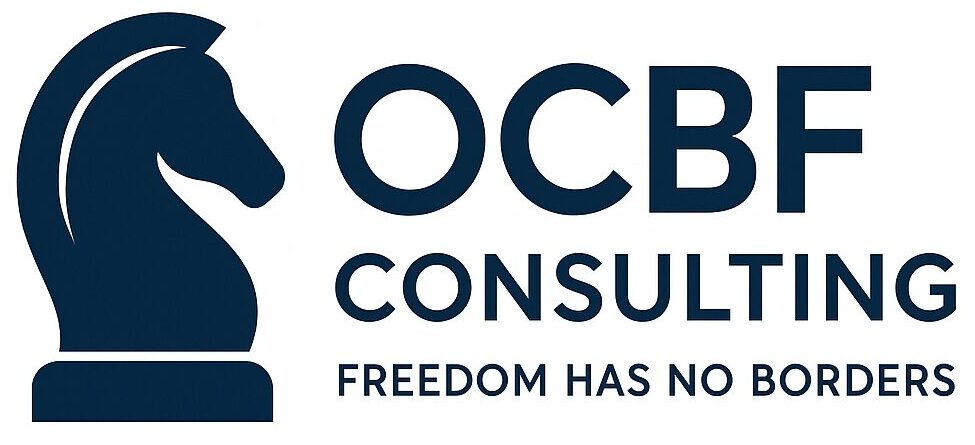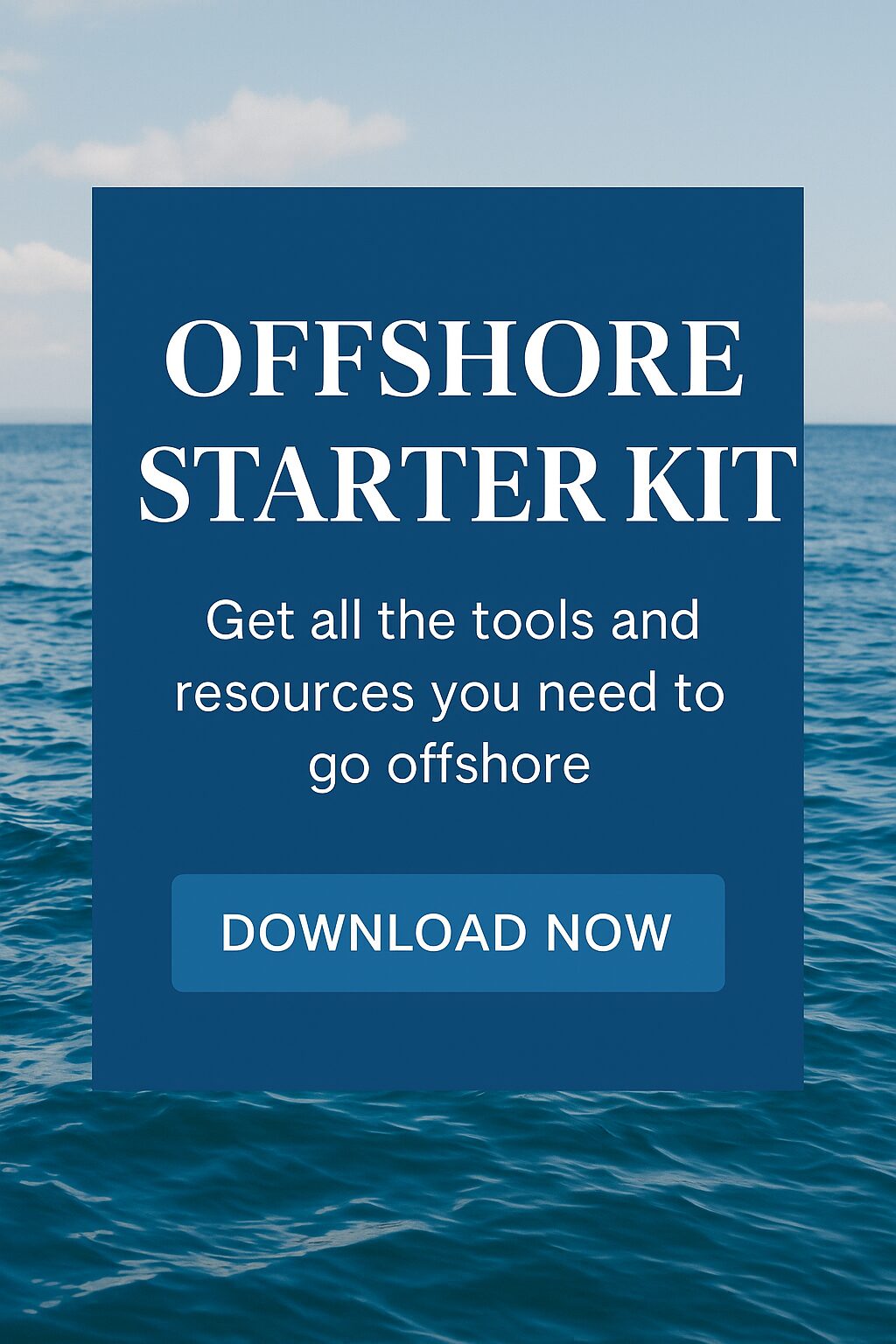When Emma swapped her London flat for a laptop in Lisbon, she thought she’d escaped the taxman.
Her clients were in California and Berlin. Payments landed in her Payoneer account in dollars and euros. She spent her mornings surfing and her evenings working from a café on Rua da Misericórdia. Life was good.
Then came the email from the Portuguese tax authority.
They’d noticed her local bank deposits, cross-referenced her foreign transfers, and decided she was a tax resident. The bill: 48 percent of her global income.
“I thought I was invisible,” she says. “Turns out, I was just portable — and taxable everywhere.”
Emma’s story isn’t rare. Around the world, millions of freelancers are living “borderless” lives while working online, earning globally, and — often without realising it — breaking the tax rules of multiple countries.
But there’s another path. Not the fantasy of secrecy or evasion, but a legal, structured offshore freelancer tax strategy that uses the same international rules governments designed for corporations — adapted for individuals who work for themselves.
It’s not about hiding from taxes. It’s about building a life where you pay them smartly, not blindly.

The Remote Revolution Meets the Revenue Men
The global freelance economy has exploded. More than 40 million digital workers now earn income from clients abroad. After COVID, the laptop class became a permanent fixture — writers, designers, coders, marketers, consultants — all working from anywhere with Wi-Fi.
But governments are catching up. What was once a grey zone of “nomadic” income is now a new frontier of enforcement. Automatic information-exchange systems mean banks report balances, payment processors report inflows, and immigration databases share travel records.
The rule of thumb is simple: if you spend long enough somewhere, they’ll expect a tax return.
That’s why the key to real financial freedom isn’t evasion — it’s structure.
Residency: The Tax Home You Didn’t Know You Had
Tax law doesn’t chase citizenship; it chases residence.
Spend more than 183 days in most countries, keep a home there, or maintain local ties, and you’re considered resident for tax. Some jurisdictions go further, applying “centre-of-life” tests: where are your family, bank accounts, or social connections?
Emma learned this the hard way. Nine months in Portugal, a local lease, and a Portuguese phone plan made her taxable on her worldwide income — even though every client was foreign.
The fix isn’t running away. It’s choosing where you’re resident on purpose.
Some countries have designed residency systems for people exactly like her — mobile, digital, and high-earning. They use territorial taxation: only income earned inside the country is taxed. Foreign income — like a freelancer’s overseas clients — is exempt.
Offshore Freelancer Tax Strategy –Territorial Tax Havens for Humans
Traditional tax havens are for corporations. Territorial regimes are for people.
In Panama, you can live year-round and only pay tax on money earned from Panamanian clients. A British designer billing U.S. firms owes zero local tax.
Georgia has a special “Individual Entrepreneur” regime: freelancers earning under ₾500,000 (~US $180,000) pay just 1 percent tax.
Costa Rica and Malaysia follow similar rules. Thailand’s new long-term visa offers residence with no tax on foreign-sourced income if remitted correctly.
You can live legally, work openly, and still reduce your effective tax rate to almost nothing — if you register properly.
The secret isn’t the passport stamp. It’s the paperwork.
The Offshore Company Advantage
Residency solves where you pay tax. Structure solves how your business pays it.
Freelancers who invoice clients directly often look like high-income individuals — triggering self-employment taxes, withholding, and scrutiny. Incorporating offshore changes that dynamic.
“Instead of Emma invoicing clients as ‘Emma Smith,’ her company — Horizon Creative Ltd. — bills them from Belize,” says tax adviser Luca Moretti. “Same work, different entity, and completely different treatment.”

When clients pay the offshore company, that income is legally earned by the company, not the individual. Depending on the jurisdiction, it may face zero or very low corporate tax. Emma then draws a salary or distribution according to her residency rules.
It’s not a loophole. It’s the same strategy used by international consultancies — scaled down to one person with Wi-Fi.
Jurisdictions like BVI, Seychelles, Belize, and UAE Free Zones are common favourites: low-cost, compliant, and accepted globally. For U.S. freelancers, foreign entities can be structured as “disregarded” to remain transparent for IRS purposes while simplifying operations.
The Blueprint: Offshore Freelancer Tax Strategy, Legal, and Smart
Here’s the anatomy of a compliant offshore freelancer tax strategy:
Step 1 — Choose your tax-friendly residency.
Base yourself in a jurisdiction that taxes only local income (e.g., Panama, Georgia, or the UAE).
Step 2 — Incorporate an offshore company.
Use it to invoice clients, sign contracts, and receive payments. The company becomes your business face to the world.
Step 3 — Keep funds offshore, spend wisely.
Pay yourself a reasonable salary or draw from the company according to your residency rules. Report income where required, but avoid triggering unnecessary double taxation.
It’s that simple in concept, complex in detail. The key is to synchronise residency, corporate domicile, and banking flow so they all tell the same legal story.
Do it right, and your taxes shrink without crossing a single ethical line.
The American Exception
If you’re a U.S. citizen, your passport follows you. America taxes worldwide income, no matter where you live.
But you still have tools. The Foreign Earned Income Exclusion (FEIE) lets you exclude about US $126,000 (2025 threshold) of earned income if you spend 330 days abroad or establish bona fide foreign residence. Add the housing exclusion, and that’s another $15–30K shielded.
Self-employment tax (Social Security and Medicare) still applies — unless you pay yourself via a properly structured foreign corporation.
Example: A developer earning $180K can exclude $126K via FEIE, pay tax only on the remainder, and offset housing. His effective tax rate drops from 33 percent to under 10 percent — fully legal, fully declared.
For high earners, forming a foreign corporation and paying a modest salary under FEIE while retaining profits offshore (subject to Subpart F/GILTI rules) can create significant deferral benefits. But precision matters; one wrong filing collapses the structure.

Offshore Freelancer Tax Strategy Case Studies: Real Numbers, Real Lives
1. The French Designer in Georgia
After years in Paris paying 45 percent tax, Amélie moved to Tbilisi. She registered as an “Individual Entrepreneur” under Georgia’s small-business regime. Earnings: €120K. Tax: €1,200. Bank account: local. Lifestyle: unchanged. She files a single annual declaration and enjoys legal residency with almost zero paperwork.
2. The U.S. Developer in Dubai
Jason, a software engineer from Austin, set up a UAE Free Zone company in Ras Al Khaimah. Corporate tax: 0 percent. He pays himself $10,000/month, covered by the FEIE. His total U.S. tax bill fell from $65K to about $9K — compliance cost included.
3. The Australian Copywriter in Panama
Lara registered a Panamanian IBC and relocated under the Friendly Nations Visa. She invoices global clients through her company. Because all income is foreign-sourced, her local tax rate is 0 percent. She maintains an accountant, files annually, and sleeps well.
These aren’t loopholes; they’re the results of using existing international rules as intended.
The Hidden Traps
Even good structures can fail through bad habits.
Freelancers often assume “offshore” means invisible. It doesn’t. Banks, payment platforms, and even Airbnb hosts now report automatically.
Others forget management and control: if you run your company from a high-tax country, that country may claim it as locally managed — and taxable.
Failing to register proper residency leaves you tax-resident nowhere — a red flag for auditors. Using personal accounts for business income confuses reporting.
And every high-tax nation now enforces Controlled Foreign Company (CFC) rules, taxing offshore profits if you personally control the entity.
“You can’t beat the system,” says Moretti. “But you can design within it.”
Compliance: The Secret Superpower
The best offshore freelancers aren’t the ones hiding — they’re the ones filing more paperwork than anyone else.
They maintain company records, local licenses, tax certificates, and annual filings. They open business bank accounts instead of mixing personal funds. They track days for residency tests and keep digital copies of invoices.
Transparency doesn’t weaken a structure; it legitimises it.
“I report everything,” says Amélie from Georgia. “That’s why I can sleep — and still keep 99 percent of my income.”
Looking Ahead: The Post-Nomad Era
Governments aren’t giving up. The OECD’s new Crypto-Asset Reporting Framework (CARF) will soon require automatic exchange of wallet and transaction data. More countries are adding digital-nomad visas that quietly establish tax residency. Even low-tax jurisdictions are introducing economic-substance rules to ensure genuine activity.
The carefree “laptop lifestyle” of the 2010s is over. The 2025 freelancer must be strategic, compliant, and deliberate.
The future belongs to those who treat their one-person business like a multinational — small in size, global in structure.

Freedom by Design
Emma eventually rebuilt her system. She registered tax residency in Panama, formed an offshore company in Belize, and opened a bank account in Singapore. Now, every payment has a paper trail — and a purpose.
Her tax bill dropped from nearly half her income to under 5 percent. She spends her mornings surfing again, but this time her emails from tax authorities say one thing: compliant.
“Freedom isn’t found by running from the system,” she says. “It’s built by designing around it.”
That’s the essence of the offshore freelancer tax strategy — not hiding, not gaming, but understanding the global rules well enough to make them work for you.
Because in the end, the most powerful passport isn’t in your pocket.
It’s in your planning.
OCBF Consulting LLC provides strategic guidance for freelancers, consultants, and digital entrepreneurs seeking compliant offshore residency and tax structures.










